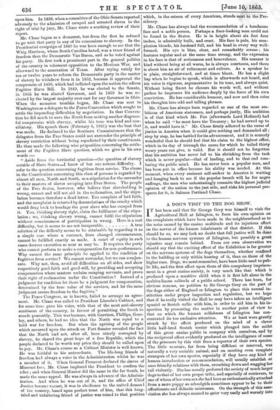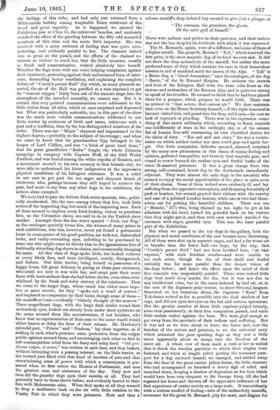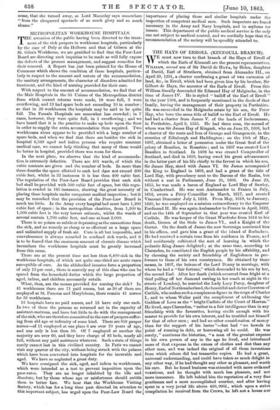A DOG'S VISIT TO THE DOG SHOW.
IT has been said that Sir George Grey was himself to visit the Agricultural Hall at Islington, to form his own opinion on the complaints which have been made in the neighbourhood as to the noise caused by the canine multitude and its injurious effect on the nerves of the human inhabitants of that district. If this should be so, we may look no doubt that full justice will be done to the human nervous systems of Islington, but possibly a great injustice may remain behind. From our own observation we should say that the exciting effect of the Exhibition is far greater on the nervous systems of the dogs themselves, whether confined in the building or only within hearing of it, than on-those of the higher race. Dogs, we must remember, have been little used to pub- lic life, and the first effect upon them of this compulsory imprison- ment in a great canine society, is very much like that which is produced upon a sensitive child when it is first left alone in the multitudinous solitude of a public school. There has been, for obvious reasons, no petition to Sir George Grey on the part of the dogs either of England or Islington to place this annual in- stitution under proper inspection and regulation, but we hope that if he really visited the Hall he may have taken an intelligent spaniel or Scotch collie with him, in order to aid him in his in- spection by presenting the matter in another point of view to that on which the human selfishness of Islington has con- centrated. its too exclusive attention. We at least were greatly struck by the effect produced on the mind of a clever little half-bred Scotch terrier which plunged into the midst of this great canine public in company with ourselves, and by the reciprocal effect evidently produced on the intelligence of some of the prisoners by this visit from a reporter of their own species. The little creature, far from being diffident or reserved, was naturally a very sociable animal, and on meeting even complete strangers of her own species, especially if they have any kind of human introduction or recommendation, will usually establish at once friendly relations with them, crouching down and wagging her tail violently. She has usually preferred the society of much larger dogs to that of her own proper tribe, and especially of retrievers, to one of whom of her own sex she had been as enthusiastically attached from a mere puppy as schoolgirls sometimes appear to be to their affectionate and didactic mistresses. On the strength of this asso- ciation she has always seemed to enter very easily and warmly into
the feelings of this tribe, and had only just returned from a Whitsuntide holiday among hospitable Essex retrievers of fine breed and great sagacity. As it happened, we entered the Exhibition just at Class 15, the retrievers' benches, and anxiously watched the effect of the greeting between the fifty odd manacled members of this class and the acute little inspector. She was received with a noisy outburst of feeling that was quite over- powering, and evidently painful to her. The clamour indeed was so great as she passed, and the efforts of the chained re- trievers so violent to reach her, that the little creature, usually so frank and communicative, retired absolutely into herself. Whether the dogs were with one voice lodging complaints against their treatment, protesting against their embarrassed form of exist- ence, demanding better ventilation, and explaining the complete failure of "Condy's patent fluid" (by which, as many placards as- serted, the air of the Hall was purified at a vast expense) to get its "nascent oxygen" fairly born out of the nascent stage into the atmosphere of the crowded assembly, we cannot say. But it is certain that very pointed communications were addressed to the little visitor from all sides, which at once surprised and depressed her. What was particularly noticable, too, in this part of the show was the much more voluble communications addressed to our little terrier by retrievers of birth and name, retrievers with a past and a tradition, than by the less distinguished members of the order. There was one " Major " eloquent and impassioned to the highest degree,—probably on the subject of his wrongs ; and when we came to know that his grandmother Gyp belonged to the keeper of Lord Clifden, and was "a bitch of great local fame," that his great grandfather " Sailor " fought the whole Crimean campaign in company with Captain Duff, of the 23rd Welsh
siliers, and was buried among the white cupolas of Benares, and a monument erected to his own memory in that historic city, we were able to understand his bitter indignation at the oppressive physical conditions of his Islington existence. It was a relief to our ears to get past the too eager and eloquent bench of retrievers, who, perhaps because they still hoped to retrieve the past, had more to say than any other dogs in the exhibition, the setters alone excepted.
We next had to pass the forlorn Irish water spaniels, who, politi- cally uneducated, like the race among whom they live, took little notice of the inspecting dog, but much of the inspecting men. Each of these seemed to implore every kind-looking visitor to purchase him, as the Circassian slaves are said to do in the Turkish slave market. Amongst them the fine water spaniel "Jock, late Nap," as the catalogue quaintly terms him, the winner of many prizes in such exhibitions, who has, however, never yet found a permanent home in consequence of his good qualities, sat with red, dishevelled locks, and vainly-entreating eyes, soliciting to be purchased by some one who might cease to devote him to the ignominious fate of habitually attending dog shows in chains, and occasionally changing his name. All this class of dogs spoke little, but looked volumes at every likely face, and were intelligent, untidy, disorganized, and forlorn. Our little terrier, being herself in possession of a happy home, felt great delicacy in gazing at these poor creatures, who could see how it was with her, and crept past their mute faces with more sadness than she had before shown, even when over- whelmed by the frank and noisy oratory of the retrievers. Thus we came to the larger dogs, whose creed was either more hope- less or more ascetic, for they "spoke not a word of sorrow," and implored no compassion by their looks, though some of them— the mastiffs at least—evidently "bitterly thought of the morrow." These magnificent dogs, with the large dark circles round their melancholy eyes, looked out sternly from under _their eyebrows on the scene around them like necessitarians, if not fatalists, who knew that no representation of their case to the outer world would either hasten or delay the hour of their release. Mr. Hanbury's splendid pair, " Prince " and "Duchess," lay close together, as if seeking in each other's presence some protection from the vulgar public opinion around them, and encouraging each other to find in self-contemplation relief from the fussy and noisy herd. "Odi pro- fanum vulgus, et arceo," was written in each face, and they looked, without betraying even a passing interest, on the little tether, as she trotted past filled with that kind of emotion of awe and that overwhelming sense of power with which a countryman is pos- sessed when he first enters the Houses of Parliament, and sees the greatest men and statesmen of the day. Only now and then did the grander dogs open their mouths at all. They had generally been to those shows before, and evidently bowed to their fate with Mahometan calm. When they spoke at all they seemed to drop a meditative bark on the air with little relation to the Vanity Fair in which they were prisoners. Now and then a
solemn mastiff's deep isolated bay seemed to give just a glimpse of "The vastness, the grandeur, the gloom,
• Of the unlit gulf of himself."
There were sadness and pathos in their patience, and their malaise was not the less deep for the fortitude with which it was repressed.
The St. Bernardo, again, were of a different, and some of them of a higher mould. The great SL Bernard "Tell," which received the first prize, is the most majestic dog of its kind we ever saw. It did not show the deep melancholy of the mastiff, but rather the same profound sense of duty which sustains the race in their benevolent mission in aid of mankind amid the snows of the Alps. "Tell" is a Berne dog, a "lineal descendant," says the catalogue, of the dog "Barry," of the St. Bernard Hospice. He endures the crowds and heat of the Islington Hall with the same calm front as the storms and avalanches of the Bernese Alps, and is quite too strong to speak of his troubles. He seemed to think that he had been placed there for a purpose, which purpose he would fulfil. There was no protest in "that severe, that earnest air." We dare maintain that even on the Home Secretary himself,—if the right honourable baronet visited him, and gazed into his deep, mild eyes,—he cast no look of reproach or pleading. There was in his expression some- thing of that moral sublimity which, according to Kant, reminds one indifferently of stars in the midnight sky, or of the solemn fiat of human free-will renouncing its own cherished desires for the claim of duty. "Not sad and not elate," his was a counte- nance on which neither terrier nor man could gaze and again for- get. Our little companion, hitherto amazed, alarmed, surprised by the many new phenomena in this chaos of canine feeling and opinion, gathered tranquillity and trust in that majestic gaze, and ceased to cower beneath the restless eyes and fretful barks of the other ill-assorted prisoners. It was a great change from this strong, self-contained, heroic dog to the deerhounds immediately adjacent. They were almost the only dogs in the assembly who seemed to enjoy the social opportunities of the place in spite even of their chains. Some of them indeed were evidently ill, and lay suffering from the oppressive atmosphere, and dreaming feverishlyof park or heather, but several greeted their visitors with the suavity and ease of a polished London hostess, while one or two laid them- selves out for petting like beautiful children. There was one (" Brandy," 477) who, being chained up too tight to get at his admirers with his head, turned his graceful back on his visitors that they might pat it, and then with eyes reverted watched the caressers with eager, grateful eyes. This was the least painful part of the Exhibition.
But when we passed to the toy dogs in the gallery, both the physical and moral conditions of the case became more distressing. All of them were shut up in separate cages, and had a far worse air to breathe than the lower hall—we hope, by the way, that " Condy's patent fluid" had not been lavished here, "at vast expense," with such fruitless results—and were unable to see each other, though the din of their shrill and fretful curiosity was far more painful than the deeper voices of the dogs below ; and hence the effect upon the mind of their free comrade was unspeakably painful. There were indeed little dogs that could sleep amidst the din, but it was not due to any intellectual calm, but to the coma induced by bad air, or, in the case of the Japanese prize terrier, to sheer Oriental languor. Stretched on her luxurious divan, the Japanese "Rose" from Yokohama retired as far as possible into the dark shadow of her cage, and did not open her eyes on the hot and curious spectators. But the greater number of these little captives yelped bitterly, some even passionately, as their free companion passed, and made little useless rushes against the bars. We were glad enough to get away from the spectacle of their tedium and suffering. But it was sad as we were about to leave the lower ball, near the benches of the setters and pointers, to see the universal envy which animated the poor sporting dogs as they saw a little sister apparently about to escape into the freedom of the outer air. A whole row of them made a rush at her so united that it shook the wooden partition to which their staples were fastened, and when at length (after getting the necessary pass- port for a dog outward bound) we emerged, and rattled away from the door of the great canine prison-house, the little creature who had accompanied us breathed a heavy sigh of relief, and crouched down, keeping a shadow of depression on her face which would have been very eloquent to Sir George Grey, till she had regained her home and thrown off the oppressive influence of her first experience of canine society on a large scale. It was evidently with a curious conflict of feeling—awe of the melancholy mastiffs, reverence for the great St. Bernard, pity for most, and disgust for some, that she turned away, as Lord Macaulay says somewhere "from the chequered spectacle of so much glory and so much shame."
































 Previous page
Previous page